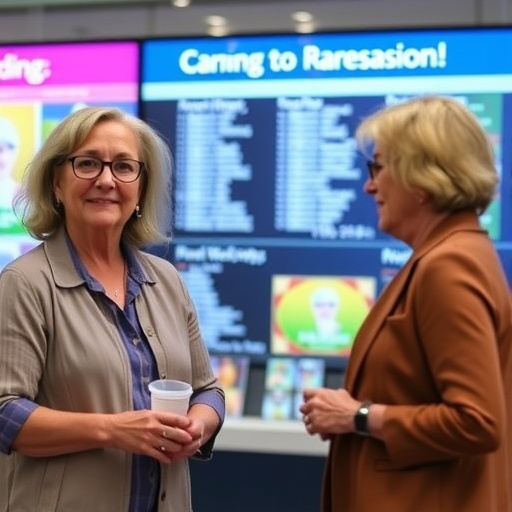In a recent study, researchers delved into the intricacies of decision-making among older women who receive information from healthcare providers regarding the cessation of breast cancer screening. This topic has gained significant attention as demographic trends show an increasing number of older adults, particularly women, who navigate the complexities of health screening recommendations. The research aims to illuminate the factors influencing these decisions, ultimately enhancing communication between providers and patients and ensuring that older women make informed choices about their healthcare.
Breast cancer remains one of the most prevalent cancers affecting women worldwide. As medical advancements yield more effective screening methods, the question of when to cease screenings for certain populations has become a nuanced topic of discussion. The guidelines recommend that women weigh the potential benefits of screening against risks such as false positives, unnecessary procedures, and psychological impacts. For older women, this decision-making process becomes even more critical given varying health statuses, life expectancy, and personal preferences.
Smith et al. (2025) meticulously designed a study to explore the thought processes of older women after they were provided with information about breast cancer screening cessation. By analyzing their responses and interpretations of the information given by screening providers, the researchers sought to uncover common themes and factors that influenced their decision-making. The study included a diverse sample of participants, ensuring representation across various demographics to garner a comprehensive understanding of the issue.
One of the prominent findings of the study is the impact of personal health beliefs and risk perceptions on decision-making. Many participants expressed a belief that continued screening was essential for prevention, driven by personal experiences or fear of a cancer diagnosis. These beliefs often conflicted with medical advice, revealing a tension between patient autonomy and clinical recommendations. This dichotomy underscores the need for clear communication that resonates with the values and fears of older women.
Moreover, the emotional aspect of dealing with cancer screening decisions could not be overlooked. Many participants reported feeling anxious or uncertain, particularly when the decision to cease screenings felt like relinquishing control over their health. Healthcare providers must acknowledge these emotional responses and provide empathetic, supportive guidance. This empathetic approach could lead to a more informed population that feels valued and heard in their healthcare journey.
The methodology employed in the study was robust, utilizing qualitative interviews to gather rich, detailed narratives from participants. This qualitative approach enabled the researchers to capture the complexities of women’s thoughts and feelings surrounding breast cancer screening cessation. The depth of these narratives provided insights into how older women process healthcare information and the various sources that inform their understanding of health risks.
An interesting point raised by participants was the role of family and social networks in decision-making. Many women indicated that discussions with family members, friends, or peers played a crucial role in shaping their attitudes toward screening cessation. This realization suggests an avenue for healthcare providers to engage family members in the decision-making process, fostering a more supportive environment that underscores shared values and collective decision-making.
Another critical aspect highlighted in the study was the credibility of information sources. Women were more likely to trust information coming from healthcare providers they had established a relationship with over the years. This relationship built trust in the provider’s recommendations regarding screening practices. Therefore, sustaining a long-term connection with patients could lead to better compliance with health recommendations and more favorable health outcomes.
As the healthcare landscape continues to evolve, and as personalized medicine becomes more prominent, this study emphasizes the need for tailoring communication strategies to engage older women effectively. Making informed choices about ending screenings for breast cancer will require nuanced approaches that respect individual values, preferences, and the diverse backgrounds of each patient.
The insights gathered from this research may prove invaluable in developing educational resources and decision aids aimed at older women. By simplifying complex medical information and addressing common fears and misconceptions, healthcare providers can empower patients to take charge of their health care decisions. This proactive approach might encourage patients to have more open discussions with their healthcare providers, fostering a collaborative decision-making process.
Furthermore, the findings of this research have implications for policy-making, as healthcare organizations and policymakers should consider the varying needs of older women when creating guidelines for breast cancer screening. Standard protocols may need to be reassessed to ensure they are aligned with the desires and experiences of patients, thereby enhancing patient care and outcomes.
In summary, Smith et al.’s (2025) research shines a light on an essential yet often overlooked topic in women’s health. By investigating the decision-making processes surrounding breast cancer screening cessation, the study provides crucial insights that can help bridge the gap between healthcare providers and older women. As society continues to age, understanding these dynamics will be vital for nurturing patient empowerment and ensuring that women feel confident and informed in their health journeys. The hope is that this research will stimulate further exploration into effective communication strategies that respect the autonomy of older patients while guiding them towards informed health decisions.
Ultimately, the conversation around when to stop breast cancer screenings is multifaceted and must account for individual preferences, emotional factors, and the importance of personalized care. By fostering an environment that encourages open dialogues and values the input from older women, healthcare professionals can play a pivotal role in shaping the future of breast cancer screening practices.
Subject of Research: Decision-making processes of older women regarding breast cancer screening cessation after receiving information from healthcare providers.
Article Title: Older Women’s Decision-Making After Receiving Information from a Screening Provider About Breast Cancer Screening Cessation.
Article References:
Smith, J., Haynes, T., Schonberg, M.A. et al. Older Women’s Decision-Making After Receiving Information from a Screening Provider About Breast Cancer Screening Cessation.
J GEN INTERN MED (2025). https://doi.org/10.1007/s11606-025-09931-7
Image Credits: AI Generated
DOI: https://doi.org/10.1007/s11606-025-09931-7
Keywords: Breast cancer, older women, decision-making, screening cessation, healthcare communication, patient empowerment.




